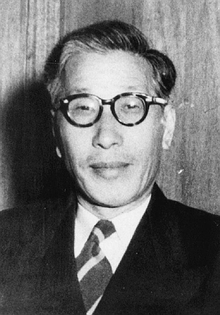Ho Chong: Difference between revisions
Neveselbert (talk | contribs) |
→Career: better english |
||
| Line 45: | Line 45: | ||
==Career== |
==Career== |
||
Heo Jeong was born in [[Busan]], [[South Gyeongsang]] province. His father, Heo Mun-il, was a wealthy merchant. In 1922 Heo |
Heo Jeong was born in [[Busan]], [[South Gyeongsang]] province. His father, Heo Mun-il, was a wealthy merchant. In 1922 Heo went into political asylum, where he lent a hand to [[Syngman Rhee]]. From 1922 to 1936, Heo participated in Korean resistance movements. On September 2, 1945, he joined the [[Korea Democratic Party]](한국 민주당, 韓國民主黨). In 1950 he was appointed to Acting Prime minister and later 1951, additionally was Minister of Health of [[South Korea]] to 1952{{clarification needed}}. In 1957 to 1959 he was appointed [[Mayor of Seoul]] and was later dispatched to Japan as the South Korean special envoy to Japan. On April 16, he became Foreign Minister. On April 25, he was appointed Acting Prime minister, and the following day President [[Syngman Rhee]]resigned. Heo Jeong was additionally Acting President to August 18 of that year. In July 16, 1960, he was appointed [[Prime minister of South Korea|6th Prime minister]], by the [[South Korea]]n [[National Assembly]]. He was remained [[President of South Korea|Acting President of South Korea]] until succeeded by [[Yun Bo-seon]] on his election. |
||
In 1919 he met [[Syngman Rhee]] |
In 1919 he met [[Syngman Rhee]] in a Methodist church of [[Seoul]]. From then until 1960 Heo Jeong was [[Syngman Rhee]]'s enthusiastic follower. |
||
==Bibliography== |
==Bibliography== |
||
Revision as of 17:31, 2 June 2017
This article may require cleanup to meet Wikipedia's quality standards. The specific problem is: poor English. (October 2013) |
Heo Jeong | |
|---|---|
허정 | |
 Jeong in the early 1950s, during his tenure as the mayor of Seoul. | |
| 6th Prime Minister of South Korea | |
| In office June 15, 1960 – August 18, 1960 | |
| Preceded by | Heo Jeong (Ministries involved) |
| Succeeded by | Chang Myon |
| Personal details | |
| Born | April 8, 1896 Pusan, Gyeongsang-do, Joseon Dynasty (now Busan Metropolitan City, South Korea) |
| Died | September 18, 1988 (aged 92) Seoul, South Korea |
| Political party | Democratic Party |
| Spouse | Baek Gui-Ran |
| Korean name | |
| Hangul | 허정 |
|---|---|
| Hanja | |
| Revised Romanization | Heo Jeong |
| McCune–Reischauer | Hŏ Chŏng |
| Art name | |
| Hangul | 우양 |
| Hanja | |
| Revised Romanization | Uyang |
| McCune–Reischauer | Uyang |
Heo Jeong (Korean: 허정; Hanja: 許政; April 8, 1896 – September 18, 1988) was a South Korean politician and Korean independence activist, who served as the sixth prime minister of South Korea during the country's Second Republic.[1]
In 1960 he was an acting prime minister during the First South Korean Republic. In addition, he headed a caretaker government for a brief time following the 1960 April Revolution which overthrew the First Republic. Heo was also known by the nickname, "Uyang" (Korean: 우양; Hanja: 友洋; literally "friend of the seas"), and an alternative name, Heo Sung-su (Korean: 허성수; Hanja: 許聖洙).
Career
Heo Jeong was born in Busan, South Gyeongsang province. His father, Heo Mun-il, was a wealthy merchant. In 1922 Heo went into political asylum, where he lent a hand to Syngman Rhee. From 1922 to 1936, Heo participated in Korean resistance movements. On September 2, 1945, he joined the Korea Democratic Party(한국 민주당, 韓國民主黨). In 1950 he was appointed to Acting Prime minister and later 1951, additionally was Minister of Health of South Korea to 1952[clarification needed]. In 1957 to 1959 he was appointed Mayor of Seoul and was later dispatched to Japan as the South Korean special envoy to Japan. On April 16, he became Foreign Minister. On April 25, he was appointed Acting Prime minister, and the following day President Syngman Rheeresigned. Heo Jeong was additionally Acting President to August 18 of that year. In July 16, 1960, he was appointed 6th Prime minister, by the South Korean National Assembly. He was remained Acting President of South Korea until succeeded by Yun Bo-seon on his election.
In 1919 he met Syngman Rhee in a Methodist church of Seoul. From then until 1960 Heo Jeong was Syngman Rhee's enthusiastic follower.
Bibliography
- 《For After Day's Testimony》(내일을 위한 증언) (SaemTer; 1979)
See also
References
- ^ "Yahu! Baekgwasajeon 야후! 백과사전 In Korean: [Yahoo! Encyclopedia], s.v. "Heo Jeong" (허정)". Archived from the original on 2012-07-14.
{{cite web}}: Unknown parameter|dead-url=ignored (|url-status=suggested) (help)
Site link
- Prime ministers of South Korea
- 1896 births
- 1988 deaths
- People from Busan
- Korean independence activists
- Government ministers of South Korea
- Korea University alumni
- South Korean anti-communists
- South Korean Methodists
- Mayors of Seoul
- Democratic Party (South Korea) politicians
- Liberal Party (South Korea) politicians
- South Korean journalists
- Korean nationalists
- Members of the National Assembly (South Korea)
- Foreign ministers of South Korea
- Acting Presidents of South Korea


